Paradise Lost (Modern Library Classics) by Milton John & William Kerrigan & John Rumrich & Stephen M. Fallon

Author:Milton, John & William Kerrigan & John Rumrich & Stephen M. Fallon [Milton, John]
Language: eng
Format: epub, mobi
ISBN: 9780307757890
Publisher: Random House Publishing Group
Published: 2011-08-31T04:00:00+00:00
5. temperate vapors bland: soothing and perfectly proportioned vapors. Sleep, it was believed, was caused by vapors arising in the stomach. Adam’s benign internal system is here perfectly blended with the external breezes and streams of Eden. th’ only sound: the sound only.
6. fuming rills: foaming brooks; some editors gloss fuming as “misting,” but the exhalations of lines 185–6 are not said to rise from streams. Aurora: goddess of the dawn.
15. peculiar: its (beauty’s) own, from the Latin peculium, “private property.”
16. Zephyrus on Flora breathes: The west wind (Zephyrus) blows gently (breathes) on the flowers (Flora, goddess of flowers).
17–25. Awake … liquid sweet: The language of Adam’s aubade is drawn from Song of Solomon 2.10–13, 7.12.
21. prime: sunrise, or the first hour of the day, which in Paradise is always six o’clock.
22. blows: blooms.
23. balmy reed: balsam.
38. Why sleep’st thou Eve?: Satan used much the same formula, as we will soon learn (l. 673), to awaken Beëlzebub, his first co-conspirator.
44. his eyes: the stars.
47. still: always.
60. god: angel. See CD 1.5.
61. reserve: referring to both God’s restriction on the fruit and man’s self-restraint.
65. horror chilled: Cp. 9.890.
66. vouched with: affirmed by.
79. “The words as we are so placed between the two sentences, as equally to relate to both” (Todd).
94. sad: grave, serious.
98. uncouth: strange, unpleasant.
100–13. But … late: The main outlines of this conventional account of the role of “Fancy” (sometimes called “Phantasy”) in dreaming can be found in Renaissance encyclopedias (Svendsen 1969, 36–38); Sir John Davies, Nosce Teipsum, 46–47; and Robert Burton, The Anatomy of Melancholy, 139–40.
109. cell: ventricle of the brain.
115. our last evening’s talk: Yesterday they spoke in general of the prohibition on the Tree of Knowledge (4.419–28) and, prompted by Eve’s question, about why the stars shine at night (4.657–88). Both concerns reappear in Eve’s dream. Yet only the second conversation took place at evening.
118. so: provided that it remains; unapproved: unchosen.
123. wont to be: are accustomed to being.
133–34. he ere they fell/Kissed: Adam’s tender gesture enacts the words be not sad (l. 116) and Be not disheartened then, nor cloud those looks (l. 122) from his just-concluded speech.
146–50. Their morning prayers unite the fallen alternatives of deliberate artistic elaboration (various style), favored by Anglicans in Milton’s day, and spontaneous inspiration (holy rapture, Unmeditated), favored by Puritans.
147. wanted: lacked.
150. numerous: subject to numbers, therefore measured, rhythmic, musical.
153–208. Giving voice to Creation, the orisons evoke Psalm 148 primarily, with touches drawn from the “Song of the Three Children,” prescribed for morning prayers as the canticle “Benedicite omnia opera Domini” in the Book of Common Prayer.
165. Cp. Rev. 22.13 (“I am the Alpha and the Omega, the first and the last”), and Ben Jonson, “To Heaven,” l. 10.
166–67. Fairest of stars: Venus or Lucifer; last … dawn: Venus, the last star of morning, is also, as Hesperus, the first star of evening.
178. not without song: the music of the spheres, inaudible on Earth after the Fall; see Nat Ode 125–29, Arcades 63–73.
181. in quaternion: in a group of four (earth, air, fire, and water).
Download
Paradise Lost (Modern Library Classics) by Milton John & William Kerrigan & John Rumrich & Stephen M. Fallon.mobi
This site does not store any files on its server. We only index and link to content provided by other sites. Please contact the content providers to delete copyright contents if any and email us, we'll remove relevant links or contents immediately.
| Ancient & Classical | Arthurian Romance |
| Beat Generation | Feminist |
| Gothic & Romantic | LGBT |
| Medieval | Modern |
| Modernism | Postmodernism |
| Renaissance | Shakespeare |
| Surrealism | Victorian |
4 3 2 1: A Novel by Paul Auster(12370)
The handmaid's tale by Margaret Atwood(7752)
Giovanni's Room by James Baldwin(7320)
Asking the Right Questions: A Guide to Critical Thinking by M. Neil Browne & Stuart M. Keeley(5757)
Big Magic: Creative Living Beyond Fear by Elizabeth Gilbert(5753)
Ego Is the Enemy by Ryan Holiday(5412)
The Body: A Guide for Occupants by Bill Bryson(5079)
On Writing A Memoir of the Craft by Stephen King(4927)
Ken Follett - World without end by Ken Follett(4720)
Adulting by Kelly Williams Brown(4564)
Bluets by Maggie Nelson(4546)
Eat That Frog! by Brian Tracy(4522)
Guilty Pleasures by Laurell K Hamilton(4439)
The Poetry of Pablo Neruda by Pablo Neruda(4093)
Alive: The Story of the Andes Survivors by Piers Paul Read(4017)
White Noise - A Novel by Don DeLillo(4001)
Fingerprints of the Gods by Graham Hancock(3991)
The Book of Joy by Dalai Lama(3972)
The Bookshop by Penelope Fitzgerald(3843)
